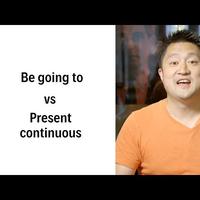Be going to vs Present continuous - English In A Minute
Be going to vs Present Continuous - English In A Minute
Be going to vs Presente continuo - English In A Minute
Be going to vs Present continuous - English In A Minute
Be going to vs Present continuous - Inglese in un minuto
Be going to vs 現在進行形 - English In A Minute
연속적으로 가다 vs 현재 - 1분 안에 영어 배우기
Be going to vs Present continuous - Angielski w Minutę
Be going to vs Present continuous - Inglês Num Minuto
Be going to vs Present continuous - English In A Minute
Be going to vs Present continuous - English In A Minute
Be going to vs Present continuous - English In A Minute
Be going to vs Present continuous - English In A Minute
Be going to vs Hiện tại tiếp diễn - English In A Minute
Be going to vs Present continuous - 一分钟英语
即將進行時與現在進行時 - 一分鍾英語
Hi! This is Kee from BBC Learning English,
Hi! Hier ist Kee von BBC Learning English,
こんにちは!BBCラーニング・イングリッシュのキーです、
MERHABA! Ben BBC Learning English'ten Kee,
Привіт, це Кі з BBC Learning English,
and today I'm going to tell you the differences
und heute werde ich Ihnen die Unterschiede erzählen
そして今日は、その違いについてお話ししよう。
ve bugün size farkları anlatacağım
і сьогодні я розповім вам про відмінності
between 'be going to' and the present continuous
zwischen 'be going to' und dem Present Continuous
be going to」と現在進行形の間
'gitmek' ile şimdiki zaman arasında
giữa 'be going to' và hiện tại tiếp diễn
介于“将要”和现在进行时之间
to talk about future plans.
um über Zukunftspläne zu sprechen.
将来の計画について話すために。
gelecek planları hakkında konuşmak için.
поговорити про плани на майбутнє.
để nói về kế hoạch tương lai.
谈论未来的计划。
We use 'be going to' to talk about future plans.
Wir verwenden „be going to“, um über Zukunftspläne zu sprechen.
be going to」は将来の計画について話すときに使う。
Gelecek planları hakkında konuşmak için 'be going to' kullanırız.
我们用“be getting to”来谈论未来的计划。
The plan will probably take place,
Der Plan wird wahrscheinlich stattfinden,
El plan probablemente se llevará a cabo,
計画はおそらく実行に移されるだろう、
Вероятно, план будет реализован,
Plan muhtemelen gerçekleşecektir,
План, ймовірно, відбудеться,
Kế hoạch có thể sẽ diễn ra,
计划大概会实现,
but it's not a definite plan.
aber es ist kein definitiver Plan.
しかし、確定的な計画ではない。
ama bu kesin bir plan değil.
але це ще не остаточний план.
但这不是一个明确的计划。
If I say:
Wenn ich sage:
と私が言えば
Eğer söylersem:
如果我说:
I'm going to meet my friends this weekend,
Ich werde dieses Wochenende meine Freunde treffen,
今週末、友達に会いに行くんだ、
Я собираюсь встретиться с друзьями в эти выходные,
Bu hafta sonu arkadaşlarımla buluşacağım,
Cuối tuần này tôi sẽ gặp bạn bè,
这个周末我要去见朋友
it means I made plans with my friends,
es bedeutet, dass ich Pläne mit meinen Freunden gemacht habe,
友達との計画を立てたということだ、
это значит, что я строил планы с друзьями,
Arkadaşlarımla plan yaptım demek,
nghĩa là tôi đã lên kế hoạch với bạn bè,
这意味着我和我的朋友们制定了计划,
but it could mean that we haven't decided where to
aber es könnte bedeuten, dass wir uns noch nicht entschieden haben, wohin
pero podría significar que no hemos decidido dónde
しかし、それはどこに行くかを決めていないということかもしれない。
но это может означать, что мы еще не решили, где
ama bu henüz nereye gideceğimize karar vermediğimiz anlamına da gelebilir.
nhưng điều đó có thể có nghĩa là chúng ta chưa quyết định nên đi đâu
但这可能意味着我们还没有决定去哪里
meet, nor have we decided what time to meet.
treffen, noch haben wir entschieden, wann wir uns treffen.
reunirse, ni hemos decidido a qué hora encontrarnos.
何時に会うかも決めていない。
ne de ne zaman buluşacağımıza karar verdik.
зустрітися, і ми не вирішили, в який час зустрітися.
gặp nhau, chúng tôi cũng chưa quyết định thời gian gặp nhau.
见面,也没有决定什么时间见面。
On the other hand, we use the present continuous
Andererseits verwenden wir das Present Continuous
一方、私たちは現在進行形を使う。
Öte yandan, şimdiki zaman kullanırız
Mặt khác, chúng ta sử dụng thì hiện tại tiếp diễn
另一方面,我们使用现在进行时
to talk about future plans that are almost definite.
um über Zukunftspläne zu sprechen, die fast definitiv sind.
ほぼ確定している将来の計画について話すためだ。
neredeyse kesin olan gelecek planları hakkında konuşmak için.
поговорити про плани на майбутнє, які вже майже визначені.
để nói về những kế hoạch tương lai gần như chắc chắn.
谈论几乎已经确定的未来计划。
If I say:
Wenn ich sage:
と私が言えば
I'm meeting my friends this weekend,
Ich treffe mich dieses Wochenende mit meinen Freunden,
今週末、友達と会うんだ、
Я встречаюсь с друзьями в эти выходные,
Bu hafta sonu arkadaşlarımla buluşacağım,
这个周末我要和朋友们见面
it means I made plans with my friends,
es bedeutet, dass ich Pläne mit meinen Freunden gemacht habe,
友達との計画を立てたということだ、
and we may have decided where to meet
und wir haben vielleicht entschieden, wo wir uns treffen
どこで会うか決めたかもしれない
и мы, возможно, решили, где встретиться
ve nerede buluşacağımıza karar vermiş olabiliriz
我们可能已经决定在哪里见面
and what time to meet.
und wann wir uns treffen.
そして何時に会うか。
ve ne zaman buluşacağımızı.
以及什么时间见面。
So, this plan is almost definite and it's difficult to cancel.
Dieser Plan ist also fast definitiv und es ist schwierig, ihn zu stornieren.
だから、このプランはほぼ確定しているし、キャンセルも難しい。
Yani, bu plan neredeyse kesin ve iptal edilmesi zor.
Vì vậy, kế hoạch này gần như chắc chắn và rất khó để hủy bỏ.
所以,这个计划几乎已经确定,很难取消。
So remember,
Also denk daran,
だから覚えておいてほしい、
the present continuous describes a more definite plan
das Present Continuous beschreibt einen genaueren Plan
現在進行形はより明確な計画を表す
şimdiki zaman daha kesin bir planı tanımlar
теперішній безперервний описує більш визначений план
现在进行时描述了更明确的计划
than 'be going to'.
als "werden".
be going to』よりも。
'gidiyor olmak'tan daha iyi.
而不是“将要”。

